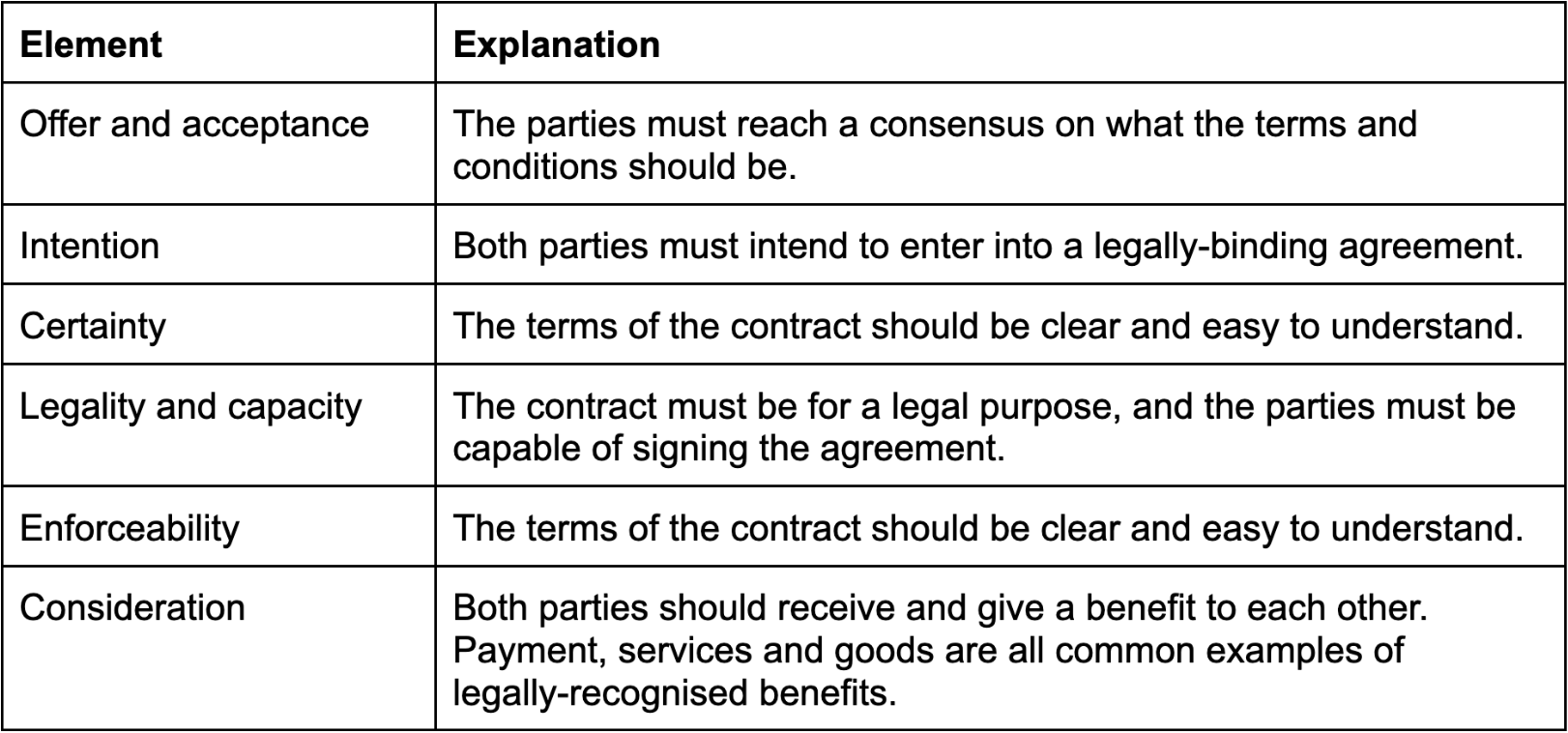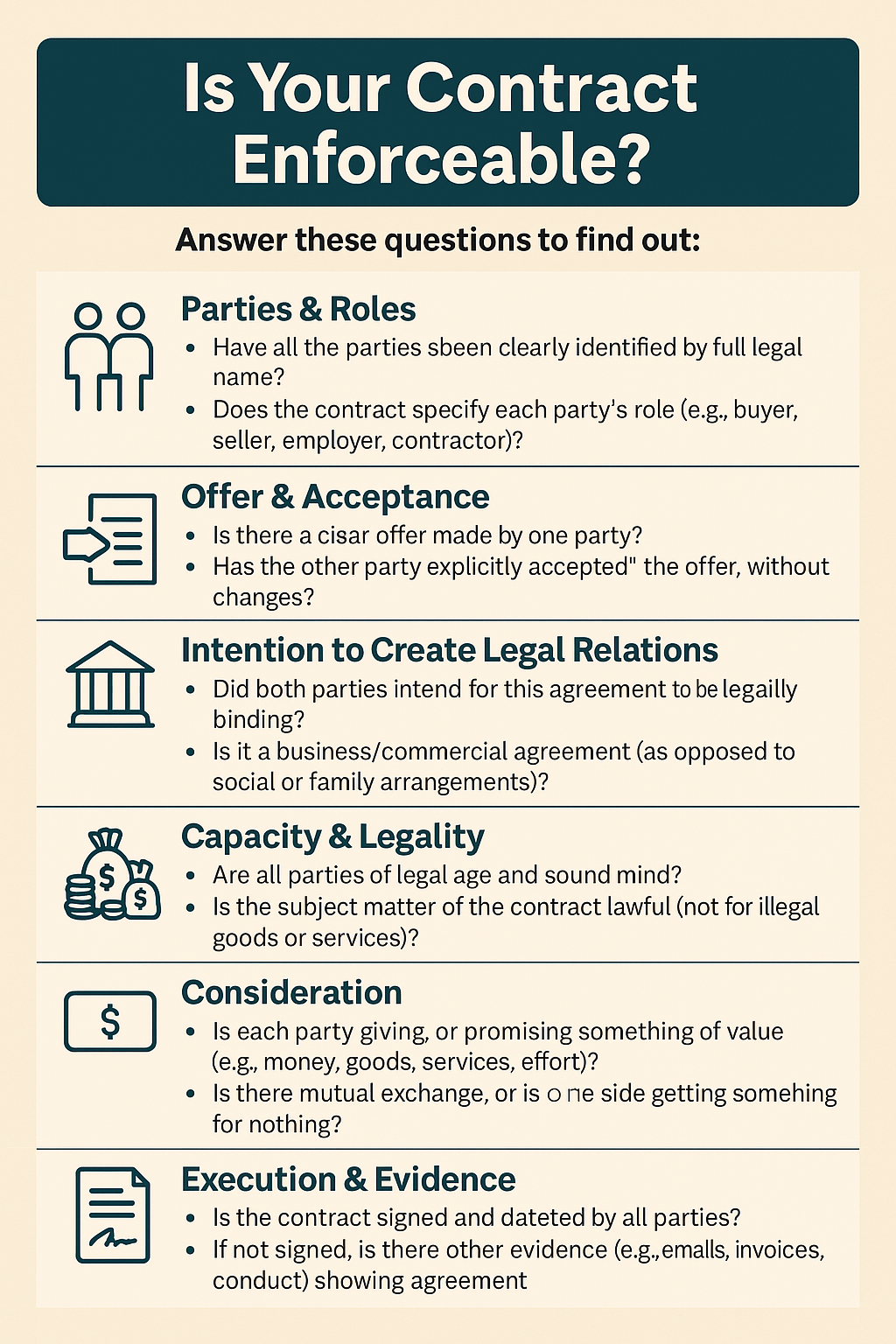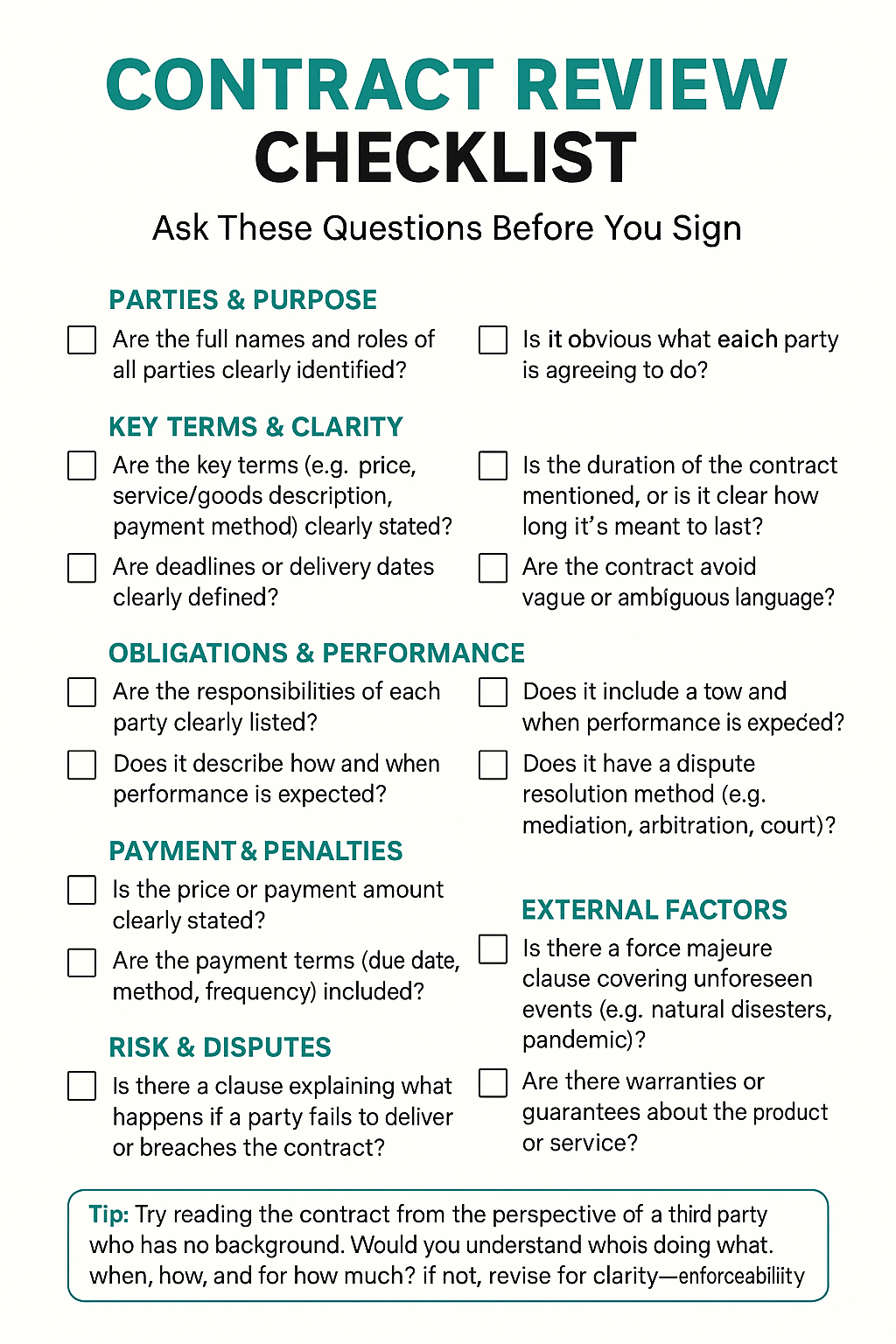What Makes A Contract Enforceable? (With Examples)
What is an Enforceable contract?
An enforceable contract is a legally binding agreement that the court will uphold if a party fails to meet their obligations. It allows the non-breaching party to seek legal remedies such as damages, specific performance etc.
Key Elements of An Enforceable Contract
For a contract to be enforceable, it must meet certain legal requirements:

Example of a valid and enforceable contract
Polly hires Tom to work at her school, promising to pay him $10,000 a month. Three months have passed since the beginning of this work contract, and yet Tom has yet to receive a cent, so he files a case against Polly for breaching their contract.
Why Is this Contract enforceable?
- Offer and Acceptance: Polly offered the job and Tom accepted the terms and conditions
- Intention: Both intended to create a legally binding contract
- Legality and Capacity: The contract is for a legal purpose and the parties are legally capable of entering into the contract
- Consideration: Tom provides work and Polly promises payment of $10,000 per month
- Certainty: The terms and conditions are clear and certain
Tom performed his obligations while Polly failed to pay for the services. Hence, Tom can legally enforce the contract and seek remedies for breach of contract.
Example of an Unenforceable Agreement
Alex agrees to sell his paintings to Benjamin, and they both agree to come up with the purchase price and date of delivery later. Later, Alex changes his mind. “But we had an agreement!” Benjamin protests, and similarly brings the case to the court.
Why is this Agreement Unenforceable?
This contract is unenforceable because the essential terms like price and delivery were never agreed by the parties. The contract lacks certainty and will not be enforceable.

Benefits of an Enforceable Contract
There are multiple benefits to having your contract be enforceable in court.
- Safeguards your legal rights. You will only be able to sue in a court of law, or get compensation for a breached contract, if the contract itself is enforceable.
- it provides a useful set of guidelines for both parties’ decisions and actions. After all, a contract is a list of requirements and obligations. By having everything spelled out clearly, you minimise the chance for misunderstandings, so that everyone can work within their assigned role more efficiently.
Contract Review Checklist: Ask these Questions before You Sign A Contract:

- Duration: Clearly state the term of the contract
This is the length of your contract. Some contracts (e.g.: sale of goods) will be a one-off exchange on a specific date. If your contract lasts for a stipulated duration, you should clearly write down the period, as well as the start and end dates.
- Example: If you’re writing an employment contract, you should clearly state the start and end times. If there are breaks, including a lunch break, you should state their lengths.
- Price: The price amount, or the mechanism for determining the price (e.g.: based on market conditions at a specified later time, which is common for contracts between manufacturers) should be listed out.
- Payment Terms: You should write out the specified payment date or deadline, whichever is applicable. You can also add requirements for how it should be paid (e.g.: bank transfer, cash, cheque). If the payment is in installments, you will need to specify how frequent the payments are.
- Penalties for Late Payment: To ensure the parties comply, you may impose penalties. I.e.: if A fails to make payments to B on time, B might have the right to withhold services. Or, they might be able to impose a late fee, increase the interest rate, or withdraw from the contract entirely. In contracts involving large transactions, B might be able to rely on A’s mortgage, if they fail to pay their dues. Adding such a clause is completely up to the parties, as long as they agree on the penalties and what situations would incur them.
- Obligations of the parties: These are the essential terms of the contract. You should describe the actions or services that are being rendered, or the goods that are being exchanged. Clearly describe what each party will be doing with enough detail (e.g.: the Vendor agrees to develop a custom software programme for the Company’s accounting activities, which shall contain the following features …)
- Detailed Timeframes: To better guide the process, there should be clear deadlines for performance, delivery, and completion. There could also be a hardship clause where party A can seek an extension of the deadline, after giving a set number of days’ notice.
- Warranties and Representations: These are promises about the condition of the goods or services. A seller might warrant that the goods are of merchantable quality, or suited for the purpose that the buyer wants them for. The same buyer might also represent (i.e.: declare) that the goods were made according to certain specifications, or handcrafted, or manufactured in a certain year.
- Force Majeure Clause: This is a clause detailing what will happen in the case of an unexpected event that majorly affects the performance of the contract. Imagine, for example, that company A purchases one million machinery parts from B, and immediately afterwards, the global price of iron unexpectedly surges. This might require significant changes to the contract, such as a complete recalibration of the purchase price, and modifying the performance deadline. As such, a force majeure clause will protect the rights of the parties in the case of a legitimate unforeseeable event, and prevent them from incurring penalties.
Final Thoughts
Still unsure about the contract drafting process? You can always start working from a template, and modify it as you go. DocLegal.AI creates customized legal documents in just a few clicks.
This includes tailor-made business agreements, general employment contracts, sales contracts, non-disclosure agreements, and more! Sign up now to enjoy 50% off your first subscription, and learn how you can simplify your day-to-day commercial and legal tasks.

.jpeg)



.jpg)
.jpg)
.jpg)